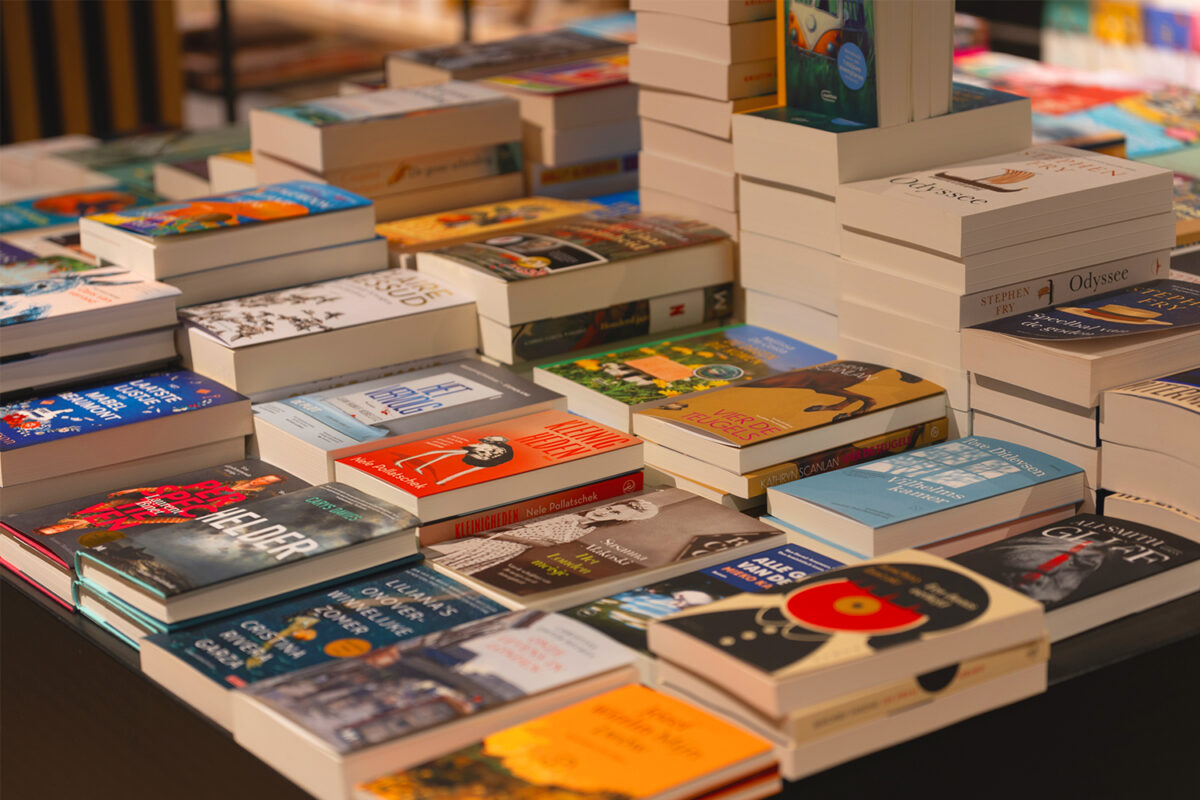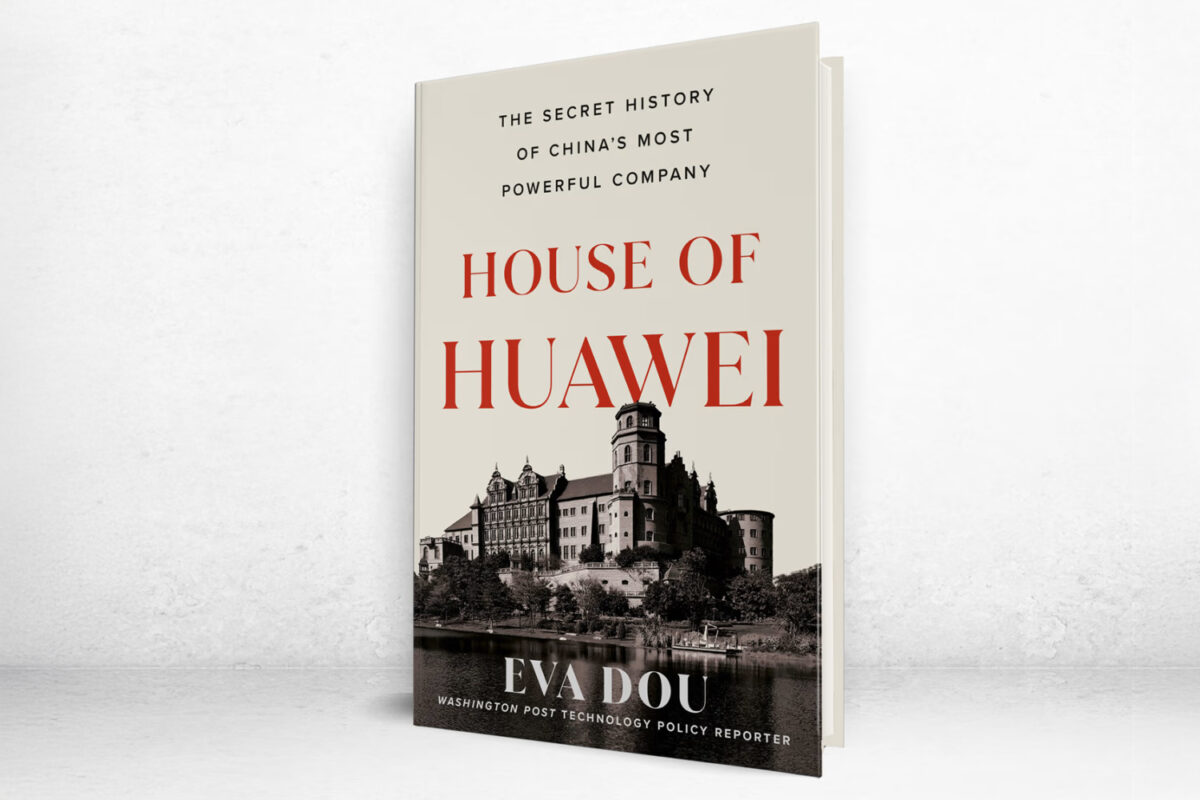As the end of 2023 fast approaches this serves as a good opportunity to share some of the favourite books that have informed our analysts.
The Coming Wave
Mustafa Suleyman
September 2023
Soon you will live surrounded by AIs. They will organise your life, operate your 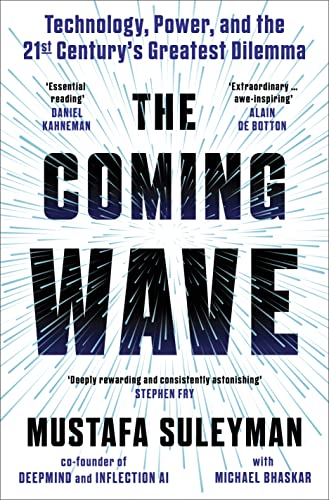 business, and run core government services. You will live in a world of DNA printers and quantum computers, engineered pathogens and autonomous weapons, robot assistants and abundant energy. None of us are prepared as co-founder of the pioneering AI company DeepMind, part of Google believes. Mustafa Suleyman has been at the centre of this revolution. In the coming decade, he argues, will be defined by this wave of powerful, fast-proliferating new technologies. In nearly 300 pages Suleyman shows how these forces will create immense prosperity but also threaten the nation-state. Can we forge a narrow path between catastrophe and dystopia? This book establishes the “containment problem” – the task of maintaining control over powerful technologies – as the essential challenge of our age. Suleyman views are grounded by historical anchors, from the Industrial Revolution, John Lane’s steel plough in 1833, the railway boom of the 1840s, to George Orwell’s 1984. He makes the point that language, agriculture, and writing were the 3 prior waves that formed the foundation of civilization, now taken for granted. For Suleyman language models such as ChatGPT are just the beginning. Soon AI will discover miracle drugs, diagnose rare diseases, run warehouses, optimise traffic, and design sustainable cities. We will be able to tell a computer program to “…make $1 million on Amazon in a few months” and it will carry out our instructions. The problem the book outlines is the same technologies that allow us to cure a disease could be used to cause one. Suleyman notes that the price of genetic sequencing has plummeted, while the ability to edit DNA with technologies such as CRISPR has vastly improved. Soon, anyone will be able to set up a genetics lab in their garage. The temptation to manipulate the human genome, he predicts, will be immense. Despite these risks, Suleyman doubts any nation will make the effort to contain these technologies. States are too dependent on their economic benefits. This is the basic dilemma: we cannot afford not to build the very technology that might cause our extinction. Sound familiar? Despite claiming that the containment problem is the “...defining challenge of our era“, Suleyman does not support a tech moratorium. Instead he sets out a series of proposals at the end of the book.
business, and run core government services. You will live in a world of DNA printers and quantum computers, engineered pathogens and autonomous weapons, robot assistants and abundant energy. None of us are prepared as co-founder of the pioneering AI company DeepMind, part of Google believes. Mustafa Suleyman has been at the centre of this revolution. In the coming decade, he argues, will be defined by this wave of powerful, fast-proliferating new technologies. In nearly 300 pages Suleyman shows how these forces will create immense prosperity but also threaten the nation-state. Can we forge a narrow path between catastrophe and dystopia? This book establishes the “containment problem” – the task of maintaining control over powerful technologies – as the essential challenge of our age. Suleyman views are grounded by historical anchors, from the Industrial Revolution, John Lane’s steel plough in 1833, the railway boom of the 1840s, to George Orwell’s 1984. He makes the point that language, agriculture, and writing were the 3 prior waves that formed the foundation of civilization, now taken for granted. For Suleyman language models such as ChatGPT are just the beginning. Soon AI will discover miracle drugs, diagnose rare diseases, run warehouses, optimise traffic, and design sustainable cities. We will be able to tell a computer program to “…make $1 million on Amazon in a few months” and it will carry out our instructions. The problem the book outlines is the same technologies that allow us to cure a disease could be used to cause one. Suleyman notes that the price of genetic sequencing has plummeted, while the ability to edit DNA with technologies such as CRISPR has vastly improved. Soon, anyone will be able to set up a genetics lab in their garage. The temptation to manipulate the human genome, he predicts, will be immense. Despite these risks, Suleyman doubts any nation will make the effort to contain these technologies. States are too dependent on their economic benefits. This is the basic dilemma: we cannot afford not to build the very technology that might cause our extinction. Sound familiar? Despite claiming that the containment problem is the “...defining challenge of our era“, Suleyman does not support a tech moratorium. Instead he sets out a series of proposals at the end of the book.
Adnan Khan
Chip War: The Fight for the World’s Most Critical Technology
Chris Miller
2022
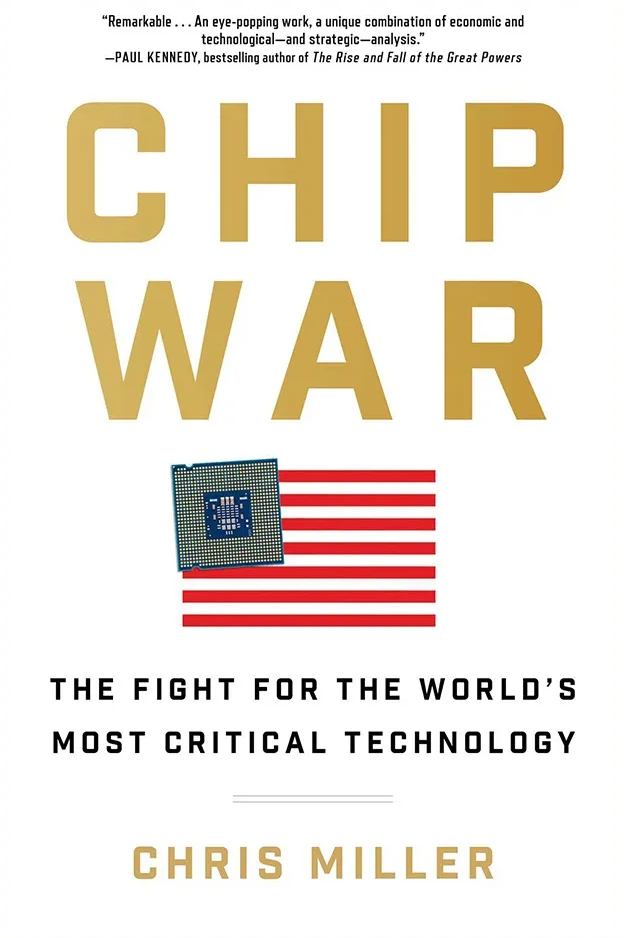
Silicon chips power everything from cars and toys to phones and nukes. “Chip War,” by Chris Miller, recounts the rise of the chip industry and the outsize geopolitical implications of its ascendancy. Miller explains a very complicated industry in digestible fashion and outlines the chip business, both in the US and in the Asian countries that dominate many parts of the supply chain for a technology that is more indispensable than oil. In his book Miller traces the intricate story of how semiconductors evolved to become the lynchpin of our modern existence. Much of the book is dedicated to the US chip industry which led the world from the 1960’s and then Miller covers its evolution to the Far East. Miller dedicates a whole chapter to China from a backwater country as early as the 1960s, China has come to flex muscles at the top echelon of the semiconductor industry. After opening up the country after the death of Chairman Mao and embracing the market system, China is now standing toe-to-toe with the US. The small country of Taiwan, which China lays claim to, may be the cause of the start of World War III if China decides to act. High-powered chips were as important as hydrocarbons in fueling China’s economic growth. Unlike oil, though, the supply of chips is monopolised by China’s geopolitical rivals. Chris Miller in his book makes the case that to make sense of the current state of politics, economics, and technology, we must understand the vital role played by chips and he covers all three in his book and that makes it a worthwhile read.
Massihollah Rohparwar
Controligharcs: Exposing the billionaire class, Their secret deals, and the globalist plot to dominate your life
Seamus Bruner
2023
Controligarchs is a book by investigative journalist Seamus Bruner, that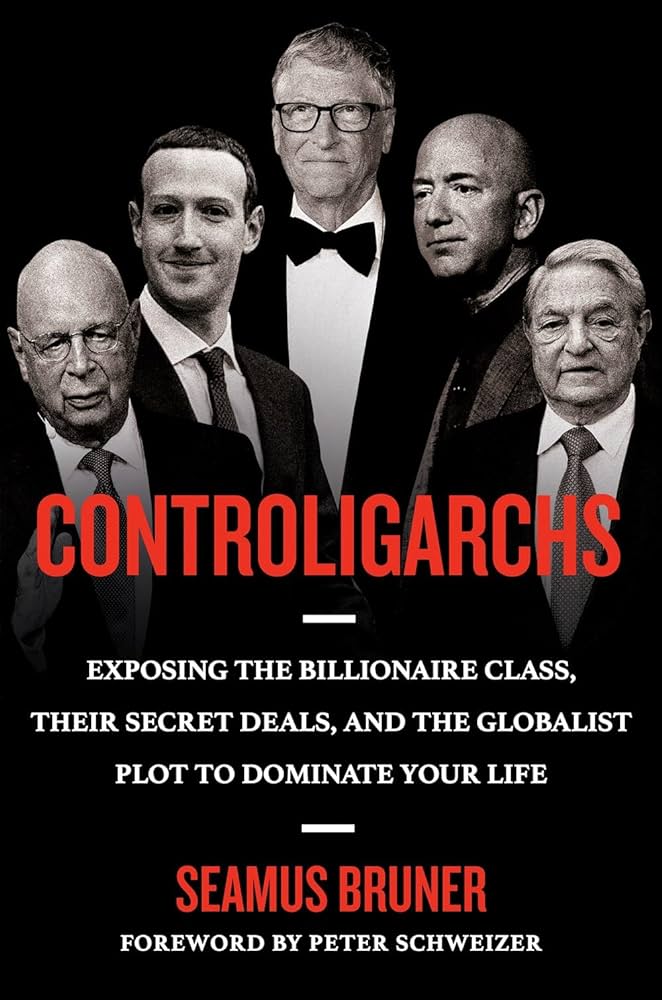 exposes the globalist elite’s playbook for the future. Brunner reveals shocking new evidence that shows how the elite’s sinister agenda is well on its way to becoming reality. He looks at their investments into eugenics research that will allow them to predetermine their children’s traits, creating a new caste system in which the ultra wealthy are able to hack their own biology to become superhuman. He looks at the billions of dollars in taxpayer-funded crony stimulus and other forms of inflation-inducing corporate welfare that has allowed the tiny elite faction to add trillions of dollars to their collective holdings, whilst most have to work hard to earn far less. The book warns of a world where everyone owns nothing and rents everything. Bruner reveals billionaires controlling power, such as Bill Gates’ $11.7 billion food takeover scheme, Mark Zuckerberg’s $36 billion tech re-engineering plan, Oprah Winfrey’s $1 billion abortion plan, Jeff Bezos’s electric vehicle ambitions, and the Soros family’s $25 billion empire project. The book is based on financial filings, insider documents, and corporate records, making a strong case for a global takeover. Bruner traces the origins of this type of control framed as philanthropy to the Rockefeller family, who hijacked America’s healthcare system and designed a healthcare system which would eliminate all traditional forms of medicine and opt for empirical based medications to increase human productivity and prevent sickness in the American economy. Who controls the world is a popular discussion on social media and podcasts and Bruner makes a good contribution backed up mountains of evidence.
exposes the globalist elite’s playbook for the future. Brunner reveals shocking new evidence that shows how the elite’s sinister agenda is well on its way to becoming reality. He looks at their investments into eugenics research that will allow them to predetermine their children’s traits, creating a new caste system in which the ultra wealthy are able to hack their own biology to become superhuman. He looks at the billions of dollars in taxpayer-funded crony stimulus and other forms of inflation-inducing corporate welfare that has allowed the tiny elite faction to add trillions of dollars to their collective holdings, whilst most have to work hard to earn far less. The book warns of a world where everyone owns nothing and rents everything. Bruner reveals billionaires controlling power, such as Bill Gates’ $11.7 billion food takeover scheme, Mark Zuckerberg’s $36 billion tech re-engineering plan, Oprah Winfrey’s $1 billion abortion plan, Jeff Bezos’s electric vehicle ambitions, and the Soros family’s $25 billion empire project. The book is based on financial filings, insider documents, and corporate records, making a strong case for a global takeover. Bruner traces the origins of this type of control framed as philanthropy to the Rockefeller family, who hijacked America’s healthcare system and designed a healthcare system which would eliminate all traditional forms of medicine and opt for empirical based medications to increase human productivity and prevent sickness in the American economy. Who controls the world is a popular discussion on social media and podcasts and Bruner makes a good contribution backed up mountains of evidence.
Heasham Yasin
The Future of Geography: How Power and Politics in Space Will Change Our World
Tim Marshall
May 2023
This book is journalist and author Tim Marshall’s third book on the future of geography,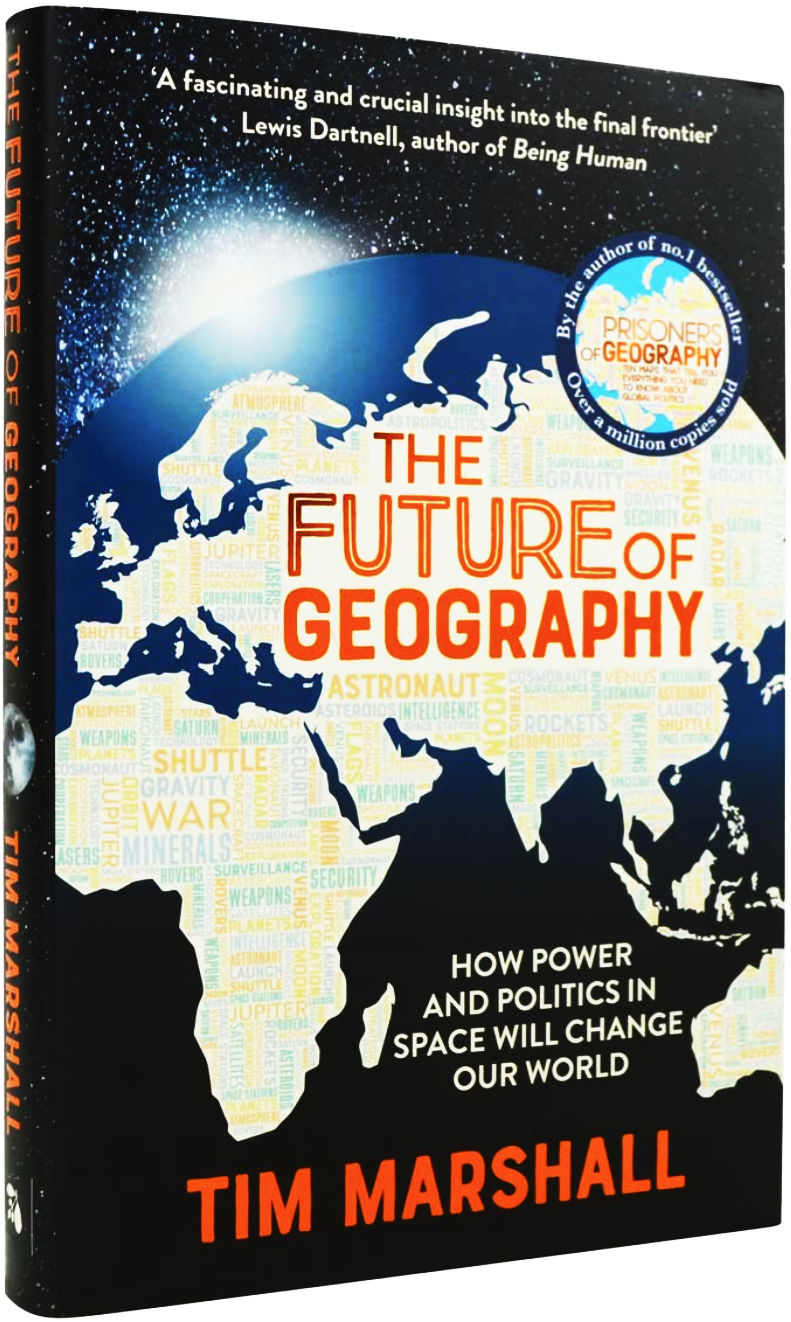 but on this occasion, he explores the future of geography – the geography beyond earth. As a non-expert, Marshall does a good job of explaining ‘Astropolitics’ to those who know little about this new emerging field which Marshall believes will be part of the next generation of great power competition. Marshall believes by the mid-2030s — only a short 10 years from now we may see the first human landing on the planet Mars. Marshall believes it’s worth taking a moment to imagine that. How many people across the world will watch this global event, if and when it happens? Which country or group of countries or even group of companies will put the first person on Mars? The future of geography provides a useful past, present and future on astropolitics. For those who follow geopolitics and global competition, this is a growing area and compulsory reading for students, activists, professionals, and everyone who wants to make sense of the world. Going forward, it may very well be events in space shaping events on Earth. Tim Marshall’s book is a good place to start making sense of this.
but on this occasion, he explores the future of geography – the geography beyond earth. As a non-expert, Marshall does a good job of explaining ‘Astropolitics’ to those who know little about this new emerging field which Marshall believes will be part of the next generation of great power competition. Marshall believes by the mid-2030s — only a short 10 years from now we may see the first human landing on the planet Mars. Marshall believes it’s worth taking a moment to imagine that. How many people across the world will watch this global event, if and when it happens? Which country or group of countries or even group of companies will put the first person on Mars? The future of geography provides a useful past, present and future on astropolitics. For those who follow geopolitics and global competition, this is a growing area and compulsory reading for students, activists, professionals, and everyone who wants to make sense of the world. Going forward, it may very well be events in space shaping events on Earth. Tim Marshall’s book is a good place to start making sense of this.
Kazi Ahmed
America As No.3: Get Real About China, India And The Rest
Hugh Peyman
July 2023
Hugh Peyman has lived in China for many years and believes the e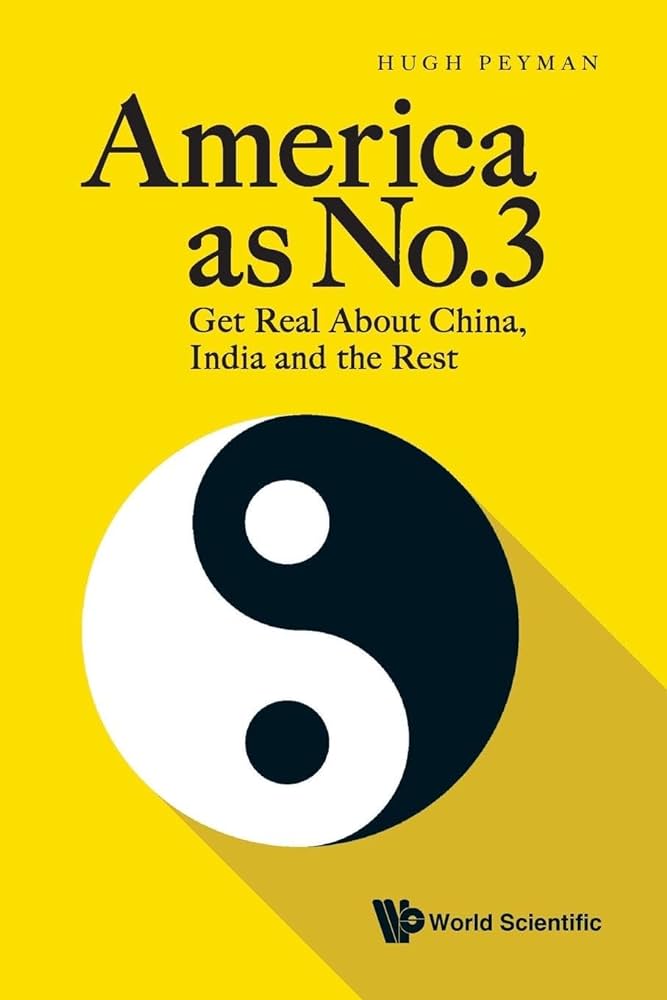 ra of unchallenged Western dominance is coming to an end and the West must adapt. He believes three giant shocks lurk right ahead for the West: economic, demographic and competence. 90% of the world’s population will soon be non-Western: no more accepting exclusion from global decision making. After COVID, Afghanistan and domestic turmoil, many question Western competence to get things right, let alone avoid nuclear destruction. What alarms Peyman the most is the fact that instead of recognising the coming loss of top status for the US, the West and its media is focussing on what is being billed as the “US-China Trade War”. Peyman warns, “One day in the 22nd century, the US could even be an upper middleweight economy, no longer even a heavy weight. This is the fate of its predecessor, the British Empire”
ra of unchallenged Western dominance is coming to an end and the West must adapt. He believes three giant shocks lurk right ahead for the West: economic, demographic and competence. 90% of the world’s population will soon be non-Western: no more accepting exclusion from global decision making. After COVID, Afghanistan and domestic turmoil, many question Western competence to get things right, let alone avoid nuclear destruction. What alarms Peyman the most is the fact that instead of recognising the coming loss of top status for the US, the West and its media is focussing on what is being billed as the “US-China Trade War”. Peyman warns, “One day in the 22nd century, the US could even be an upper middleweight economy, no longer even a heavy weight. This is the fate of its predecessor, the British Empire”
Mehvish Ali
Why Empires Fall: Rome, America, and the Future of the West
Peter Heather and John Rapley
2023
Over the last three centuries, the West rose to dominate the planet. Then, sudd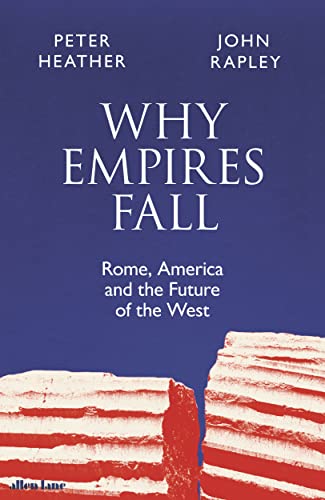 enly, around the turn of the millennium, history reversed. Faced with economic stagnation and internal political division, the West has found itself in rapid decline. This is not the first time the global order has witnessed such a dramatic rise and fall. The Roman Empire followed a similar arc from dizzying power to disintegration. In Why Empires Fall, historian Peter Heather and political economist John Rapley use this Roman past to think anew about the contemporary West, its state of crisis, and what paths can be taken to get out of it. Heather and Rapley explore the parallels and differences between the two cases. The central theme of this book is that just as Rome’s rise created an empire that stretched from Scotland to the Euphrates, it inadvertently led to the rise of other powers on its periphery, such as Persia, the Visigoths, and the Vandals. Despite Edward Gibbon’s six-volume 1776 classic “The Decline and Fall of the Roman Empire” which stressed Rome’s fall being caused by its inability or unwillingness to control its borders, archaeological findings over the past few decades have shown Rome’s fall wasn’t the long, slow decline, as Gibbon claimed. Rome’s insatiable quest for more land and treasure led it to overreach, stressing its internal political system while strengthening its neighbours. In one sentence the Roman Empire’s prosperity sowed the seeds of its demise. The authors believe the West is confronting the same reality and blowback with the growing wealth of former developing countries. The West must accept the reality that its power is waning, the authors assert. It can either retrench and close its borders or acknowledge the facts of a new world order. The authors assess how the West can avoid Rome’s fate. The West can no longer expect to solve its internal political and economic problems by relying on cheap labour and resources from developing countries. The authors propose the West needs to confront the reality of an ageing population. This book once again makes comparison with the decline of the West and the Roman Empire and also looks at the differences and for this reason it makes interesting reading.
enly, around the turn of the millennium, history reversed. Faced with economic stagnation and internal political division, the West has found itself in rapid decline. This is not the first time the global order has witnessed such a dramatic rise and fall. The Roman Empire followed a similar arc from dizzying power to disintegration. In Why Empires Fall, historian Peter Heather and political economist John Rapley use this Roman past to think anew about the contemporary West, its state of crisis, and what paths can be taken to get out of it. Heather and Rapley explore the parallels and differences between the two cases. The central theme of this book is that just as Rome’s rise created an empire that stretched from Scotland to the Euphrates, it inadvertently led to the rise of other powers on its periphery, such as Persia, the Visigoths, and the Vandals. Despite Edward Gibbon’s six-volume 1776 classic “The Decline and Fall of the Roman Empire” which stressed Rome’s fall being caused by its inability or unwillingness to control its borders, archaeological findings over the past few decades have shown Rome’s fall wasn’t the long, slow decline, as Gibbon claimed. Rome’s insatiable quest for more land and treasure led it to overreach, stressing its internal political system while strengthening its neighbours. In one sentence the Roman Empire’s prosperity sowed the seeds of its demise. The authors believe the West is confronting the same reality and blowback with the growing wealth of former developing countries. The West must accept the reality that its power is waning, the authors assert. It can either retrench and close its borders or acknowledge the facts of a new world order. The authors assess how the West can avoid Rome’s fate. The West can no longer expect to solve its internal political and economic problems by relying on cheap labour and resources from developing countries. The authors propose the West needs to confront the reality of an ageing population. This book once again makes comparison with the decline of the West and the Roman Empire and also looks at the differences and for this reason it makes interesting reading.
Umar Ahmed
India is broken —A People Betrayed, 1947 to Today
Ashoka Mody
Feb 2023
With elections looming in 2024 Narendra Modi’s government has been promoting a 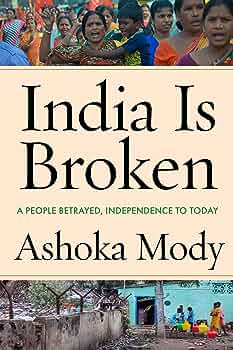 triumphalist narrative echoed by supporters in business in the diaspora — in which India’s moment as a leading world economy and diplomatic power has arrived, thanks to its policies over the past nine years, from building public toilets to issuing everyone a biometrics-based digital ID. During its G20 presidency, Modi’s government championed the notion that India’s moment as a leading world economy has arrived, along with its role as a top table power that might serve as a democratic counterweight to China, while speaking for the Global South on issues ranging from digital inclusion to the war in Ukraine. But government critics in academia, journalism, and civil society, who have been sidelined during Modi’s crackdown on free expression and foreign funding, have long insisted the glass was half empty. They point out that India has always had a large population and for decades been described as an economic miracle waiting to happen. Ashoka Mody, a former World Bank and IMF official and visiting professor at Princeton, paints the economic and political story of independent India and its not a pretty picture. From Jawaharlal Nehru to Narendra Modi, the author spares no one. It is a story of missed opportunities and wrong turns. It is the story of a society whose moral fabric is tearing not just at the edges but getting ripped right at the middle. Mody covers the Nehruvian big industry strategy and ends with the devastation wrought by Covid’s deadly second wave. The book presents many hard and uncomfortable truths that will likely make Indian readers wince. But the detail and breadth makes it a credible read.
triumphalist narrative echoed by supporters in business in the diaspora — in which India’s moment as a leading world economy and diplomatic power has arrived, thanks to its policies over the past nine years, from building public toilets to issuing everyone a biometrics-based digital ID. During its G20 presidency, Modi’s government championed the notion that India’s moment as a leading world economy has arrived, along with its role as a top table power that might serve as a democratic counterweight to China, while speaking for the Global South on issues ranging from digital inclusion to the war in Ukraine. But government critics in academia, journalism, and civil society, who have been sidelined during Modi’s crackdown on free expression and foreign funding, have long insisted the glass was half empty. They point out that India has always had a large population and for decades been described as an economic miracle waiting to happen. Ashoka Mody, a former World Bank and IMF official and visiting professor at Princeton, paints the economic and political story of independent India and its not a pretty picture. From Jawaharlal Nehru to Narendra Modi, the author spares no one. It is a story of missed opportunities and wrong turns. It is the story of a society whose moral fabric is tearing not just at the edges but getting ripped right at the middle. Mody covers the Nehruvian big industry strategy and ends with the devastation wrought by Covid’s deadly second wave. The book presents many hard and uncomfortable truths that will likely make Indian readers wince. But the detail and breadth makes it a credible read.
Shabih Ul Hasan
Xi Jinping: The Hidden Agendas of China’s Ruler for Life
Willy Lam
August 2023
After the death of Mao Zedong in 1976, the Chinese Communis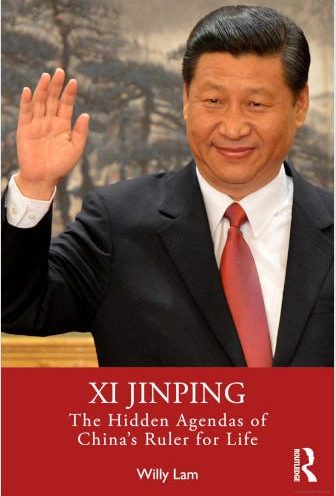 t Party (CCP) led by Deng Xiaoping introduced reforms intended to stop the centralisation of political power in China. The reforms introduced fixed terms of office, term limits, a mandatory retirement age, and the delegation of power from the CCP to government agencies. These measures were adopted to institutionalise collective leadership and prevent the rise of a single political strongman. But Xi Jinping has undone all these reforms and now amassed nearly unchecked power and gained the loyalty of the CCP in ways not seen since the days of Mao. Willy Lam in his book details what Xi wants to achieve by wielding nearly unrivalled power over virtually all aspects of the Chinese state, economy, and society. Lam is a Senior Fellow at the Jamestown Foundation who has been writing about China for more than 40 years. Lam describes how Xi has reconstituted many of the mechanisms Mao had used to consolidate power. Lam assesses Xi Jinping agenda dedicating four chapters on how Xi is pursuing a plan to remake Chinese socialist ideology, deepen the reach and power of the surveillance state, enhance the party’s control over the Chinese economy, and establish a new set of international norms of behaviour and Sino-centric world order. Lam argues that one-man rule and party state dominance has left Beijing with few measures to contend with the country’s mounting socioeconomic challenges. As China is expected to be the challenger to the global system, this book provides a good insight into what is happening inside China’s ruling class and the domestic challenges that are emerging.
t Party (CCP) led by Deng Xiaoping introduced reforms intended to stop the centralisation of political power in China. The reforms introduced fixed terms of office, term limits, a mandatory retirement age, and the delegation of power from the CCP to government agencies. These measures were adopted to institutionalise collective leadership and prevent the rise of a single political strongman. But Xi Jinping has undone all these reforms and now amassed nearly unchecked power and gained the loyalty of the CCP in ways not seen since the days of Mao. Willy Lam in his book details what Xi wants to achieve by wielding nearly unrivalled power over virtually all aspects of the Chinese state, economy, and society. Lam is a Senior Fellow at the Jamestown Foundation who has been writing about China for more than 40 years. Lam describes how Xi has reconstituted many of the mechanisms Mao had used to consolidate power. Lam assesses Xi Jinping agenda dedicating four chapters on how Xi is pursuing a plan to remake Chinese socialist ideology, deepen the reach and power of the surveillance state, enhance the party’s control over the Chinese economy, and establish a new set of international norms of behaviour and Sino-centric world order. Lam argues that one-man rule and party state dominance has left Beijing with few measures to contend with the country’s mounting socioeconomic challenges. As China is expected to be the challenger to the global system, this book provides a good insight into what is happening inside China’s ruling class and the domestic challenges that are emerging.
Adnan Khan
Has China Won? The Chinese Challenge to American Primacy
Kishore Mahbubani
2020
Kishore Mahbubani, the seasoned Singaporean diplomat p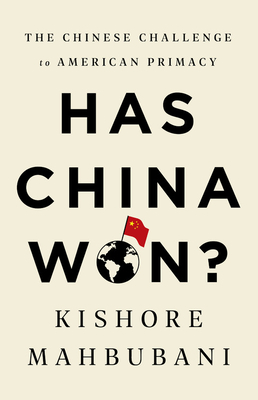 rovides his views on the geopolitical struggle of the century. His paradoxical conclusion is that “…a major geopolitical contest between America and China is both inevitable and avoidable.” He fears a great and unnecessary tragedy coming from the geopolitical contest between America and China, a contest which has only been aggravated by COVID-19. Mahbubani sets out to chart China’s coming challenge to the US’s global supremacy. With the US he sees rampant inequality, high incarceration rates, its foolish forays into overseas conflicts and its self-destructive domestic politics as areas of concern. Mahbubani explores the US-China relationship and lambasts American exceptionalism. He goes as far as to claim that the entire American voting process, America’s most sacred democratic activity, no longer exists in any meaningful capacity. Instead, in his view, a powerful and moneyed American elite almost entirely controls the law of the land, with public voting now only for show. His criticism of China is its obsession over short term strategies such as pressuring smaller neighbouring nations indirectly or directly into doing things that favour China and score political points at home which give it a bad name globally. The book’s central question is answered: in terms of future-proof administration, China has won. This book does a good job on how to see the Sino-American contest and the strengths and weaknesses of both nations’ approaches.
rovides his views on the geopolitical struggle of the century. His paradoxical conclusion is that “…a major geopolitical contest between America and China is both inevitable and avoidable.” He fears a great and unnecessary tragedy coming from the geopolitical contest between America and China, a contest which has only been aggravated by COVID-19. Mahbubani sets out to chart China’s coming challenge to the US’s global supremacy. With the US he sees rampant inequality, high incarceration rates, its foolish forays into overseas conflicts and its self-destructive domestic politics as areas of concern. Mahbubani explores the US-China relationship and lambasts American exceptionalism. He goes as far as to claim that the entire American voting process, America’s most sacred democratic activity, no longer exists in any meaningful capacity. Instead, in his view, a powerful and moneyed American elite almost entirely controls the law of the land, with public voting now only for show. His criticism of China is its obsession over short term strategies such as pressuring smaller neighbouring nations indirectly or directly into doing things that favour China and score political points at home which give it a bad name globally. The book’s central question is answered: in terms of future-proof administration, China has won. This book does a good job on how to see the Sino-American contest and the strengths and weaknesses of both nations’ approaches.
Michelle Zhang
Conflict: The Evolution of Warfare from 1945 to Ukraine
David Petraeus & Andrew Roberts
October 2023
Former CIA director and CENTCOM commander General David Petraeus pairs  with historian and member of the British House of Lords Andrew Roberts to take on the huge task of synthesising warfare since 1945 into a coherent and digestible narrative. Both authors recognised that seeking to detail every armed conflict since the end of the Second World War would require multiple volumes, the authors instead chose to prioritise “…conflicts that have contributed to the evolution of warfare.” The selection includes every major American war in the period, Israel’s war of independence, the Six Day and Yom Kippur Wars, the Falklands, and the Iran-Iraq War. Also present is an examination of wars of decolonization in Kashmir, Malaya, French Indochina, Algeria as well as nationalist conflicts in the 1990s in Ossetia, the former Yugoslavia, and Rwanda. In all its case studies, Conflict provides a succinct narrative describing the origins, execution, and results of the war that is accessible and generally falls within the established history. The book’s central theme is that of strategic leadership. Whether exercised by political or military figures, Petraeus and Roberts argue, it is understanding of the big picture that determines a protagonist’s chances of battlefield success. They identify four characteristics that an effective leader must demonstrate: a grasp of the overall strategic situation; an ability to communicate; being able to implement a plan; and to know how to refine and adapt ‘big ideas’ so that they can be applied again in different circumstances. As the general who led both the Iraq and Afghan wars these chapters differ from the others in being written by the general in the first person. His opinions on the reasons for ultimate Western failure are outlined. Conflict is a wide-ranging book and the parallels it makes between different conflicts and the lessons drawn make it a good read for both specialists and newcomers to the subject.
with historian and member of the British House of Lords Andrew Roberts to take on the huge task of synthesising warfare since 1945 into a coherent and digestible narrative. Both authors recognised that seeking to detail every armed conflict since the end of the Second World War would require multiple volumes, the authors instead chose to prioritise “…conflicts that have contributed to the evolution of warfare.” The selection includes every major American war in the period, Israel’s war of independence, the Six Day and Yom Kippur Wars, the Falklands, and the Iran-Iraq War. Also present is an examination of wars of decolonization in Kashmir, Malaya, French Indochina, Algeria as well as nationalist conflicts in the 1990s in Ossetia, the former Yugoslavia, and Rwanda. In all its case studies, Conflict provides a succinct narrative describing the origins, execution, and results of the war that is accessible and generally falls within the established history. The book’s central theme is that of strategic leadership. Whether exercised by political or military figures, Petraeus and Roberts argue, it is understanding of the big picture that determines a protagonist’s chances of battlefield success. They identify four characteristics that an effective leader must demonstrate: a grasp of the overall strategic situation; an ability to communicate; being able to implement a plan; and to know how to refine and adapt ‘big ideas’ so that they can be applied again in different circumstances. As the general who led both the Iraq and Afghan wars these chapters differ from the others in being written by the general in the first person. His opinions on the reasons for ultimate Western failure are outlined. Conflict is a wide-ranging book and the parallels it makes between different conflicts and the lessons drawn make it a good read for both specialists and newcomers to the subject.
Mozimmal Hussain
Unsettled: What Climate Science Tells Us, What It Doesn’t, and Why It Matters
Dr. Steven E. Koonin
2021
Climate science is one of those fields where you routinely hear that the science is 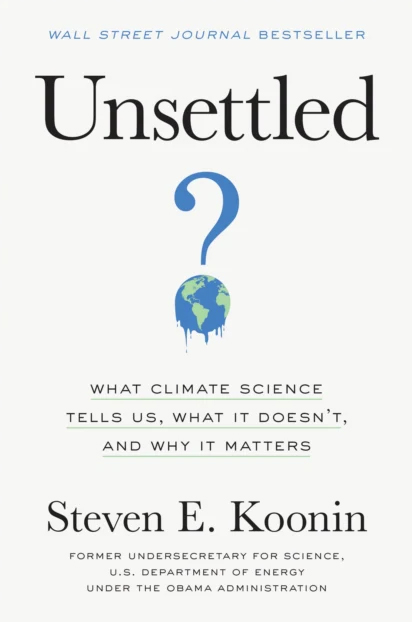 settled. Koonin shoots down the idea that science can be settled. Some scientists may agree that the climate is warming, but when you pick apart the details—asking “Why is the climate warming?” or “How serious is it really?” — there is nowhere near that level of agreement. Koonin is highly qualified, having worked in industry, and government as an undersecretary in the Obama administration. He has spent years scrutinising climate hysteria and the data behind it. In Unsettled the recurring argument is that historical observations of climate and weather phenomena are too broad and uncertain to make definitive statements about human influence. Yet, such definitive statements can be found in the mass media and even some government reports, thus exaggerating both the impacts of climate change and the urgency of mitigating it. To prove this Koonin takes a deep dive into heat waves, sea levels rising and glaciers melting as well as tropical cyclones. Koonin outlines the limits of climate science and the problems of this being communicated to the world. He believes the science of our planet is particularly ill-suited for headlines and sound bites. Modelling results are sometimes received too credulously, rather than with an appropriately sized grain of salt. Koonin provides a fresh approach to the climate debate and his knowledge of climate science makes this a good book to understand the climate debate.
settled. Koonin shoots down the idea that science can be settled. Some scientists may agree that the climate is warming, but when you pick apart the details—asking “Why is the climate warming?” or “How serious is it really?” — there is nowhere near that level of agreement. Koonin is highly qualified, having worked in industry, and government as an undersecretary in the Obama administration. He has spent years scrutinising climate hysteria and the data behind it. In Unsettled the recurring argument is that historical observations of climate and weather phenomena are too broad and uncertain to make definitive statements about human influence. Yet, such definitive statements can be found in the mass media and even some government reports, thus exaggerating both the impacts of climate change and the urgency of mitigating it. To prove this Koonin takes a deep dive into heat waves, sea levels rising and glaciers melting as well as tropical cyclones. Koonin outlines the limits of climate science and the problems of this being communicated to the world. He believes the science of our planet is particularly ill-suited for headlines and sound bites. Modelling results are sometimes received too credulously, rather than with an appropriately sized grain of salt. Koonin provides a fresh approach to the climate debate and his knowledge of climate science makes this a good book to understand the climate debate.
Anam Sultan
Reinventing the Sheikhdom: Clan, Power and Patronage in Mohammed bin Zayed’s UAE
Matthew Hedges
2021
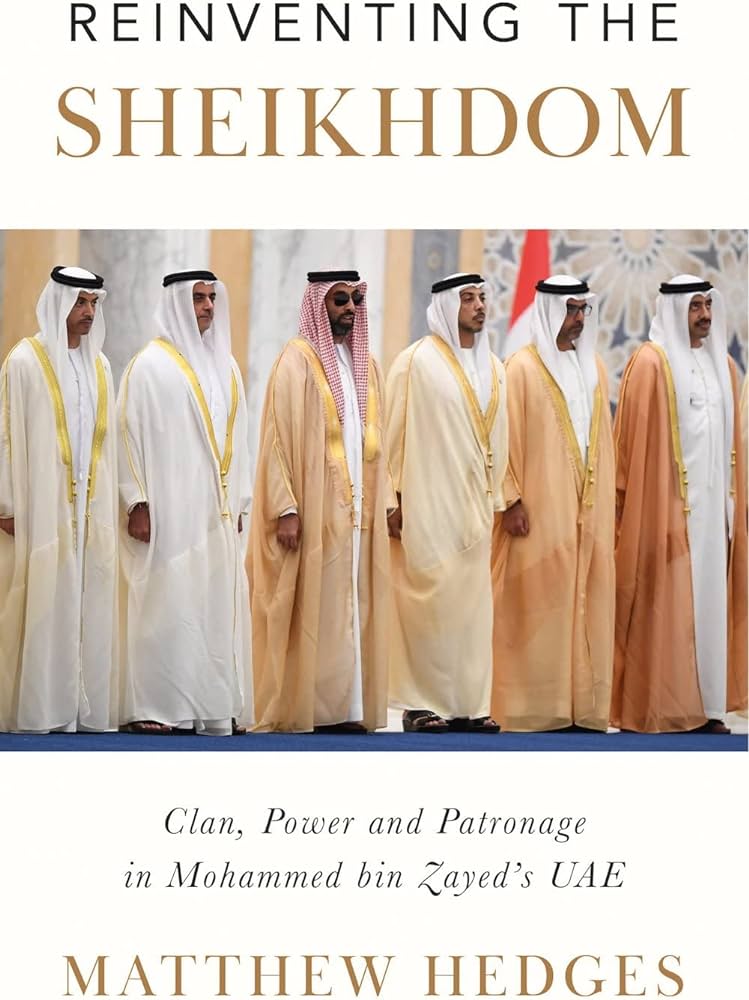
The author Matthew Hedges had his own brush with the security apparatus in the sheikhdom when he was arrested in 2018 while doing research for his PhD. He was accused of spying for the British government and given a life sentence, only to be pardoned on the UAE’s national day that same year. The experience gave him a unique insight into the tensions within the UAE as he sets out to untangle the nature of power in one of the Middle East’s richest states. The book is not about his personal experience, but what Hedges believes is the al-Nahyan’s ultimate goal — regime survival. “The principal threat to the UAE originates from domestic rather than foreign sources.” The UAE responded to the 2011 Arab Spring by, “Increasing centralisation of the state’s power, rising bureaucracy…” and “…a move towards a unitary state.” The future of the UAE, he writes, has been bound to the survival of the Abu Dhabi ruling family, in particular to Mohammed Bin Zayed Al-Nahyan and his own family. According to Hedges, fear of domestic unrest is fuelled by the UAE’s history. In the 1970s and 1980s, internal rivalry led to constant infighting, power seizures and killings. “Numerous reports suggest that because of the series of assassinations, the mother of Sheikh Shakhbut bin Sultan Al-Nayhan and Sheikh Zayed bin Sultan Al-Nahyan, Sheikha Salama bint Butti, demanded her sons pledge an oath ‘to refrain from any conspiracy.’ ” Hedges’ book contributes to a growing body of work seeking to make sense of how power functions and the internal tensions it creates in the Gulf. This makes the book essential reading for those wanting to make sense of a country that is playing a growing role in the region.
Syed Fahad
Ten Myths About Israel
Ilan Pappe
2017
In this ground breaking book the outspoken Israeli historian 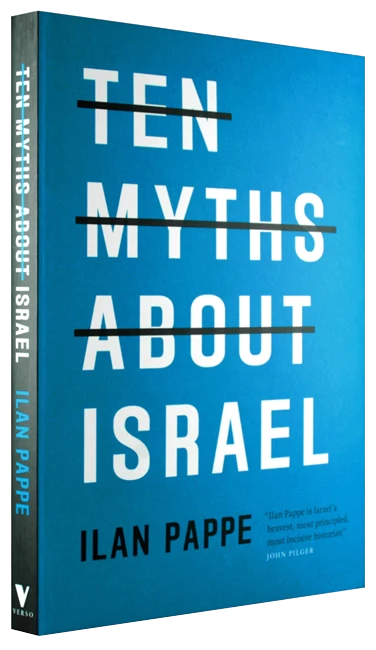 Ilan Pappe examines the most contested ideas concerning the origins and identity of Israel. Pappe identifies ten fundamental myths which are discussed in separate chapters. The analysis incorporates a historical framework, its absorption by the international community and its repercussions upon Palestinian memory and the scarce options available for anti-colonial struggle and autonomy. In Ten Myths Pappe explores the myths repeated endlessly in the media, enforced by the military, accepted without question by the world’s governments, reinforcing the regional status quo. Pappe’s book is methodical, presenting facts with precision in a historical timeline. Pappe challenges Israeli narratives through facts which Israel and the international community have striven to wipe out and manipulate. Pappe does a very good job at highlighting the historical background to many of the arguments and provides lots of evidence showing their roots, evolution and how they are used to justify occupation.
Ilan Pappe examines the most contested ideas concerning the origins and identity of Israel. Pappe identifies ten fundamental myths which are discussed in separate chapters. The analysis incorporates a historical framework, its absorption by the international community and its repercussions upon Palestinian memory and the scarce options available for anti-colonial struggle and autonomy. In Ten Myths Pappe explores the myths repeated endlessly in the media, enforced by the military, accepted without question by the world’s governments, reinforcing the regional status quo. Pappe’s book is methodical, presenting facts with precision in a historical timeline. Pappe challenges Israeli narratives through facts which Israel and the international community have striven to wipe out and manipulate. Pappe does a very good job at highlighting the historical background to many of the arguments and provides lots of evidence showing their roots, evolution and how they are used to justify occupation.
Adnan Khan
Oppenheimer
Christopher Nolan
July 2023
Christopher Nolan’s blockbuster biopic on J Robert Oppenheimer 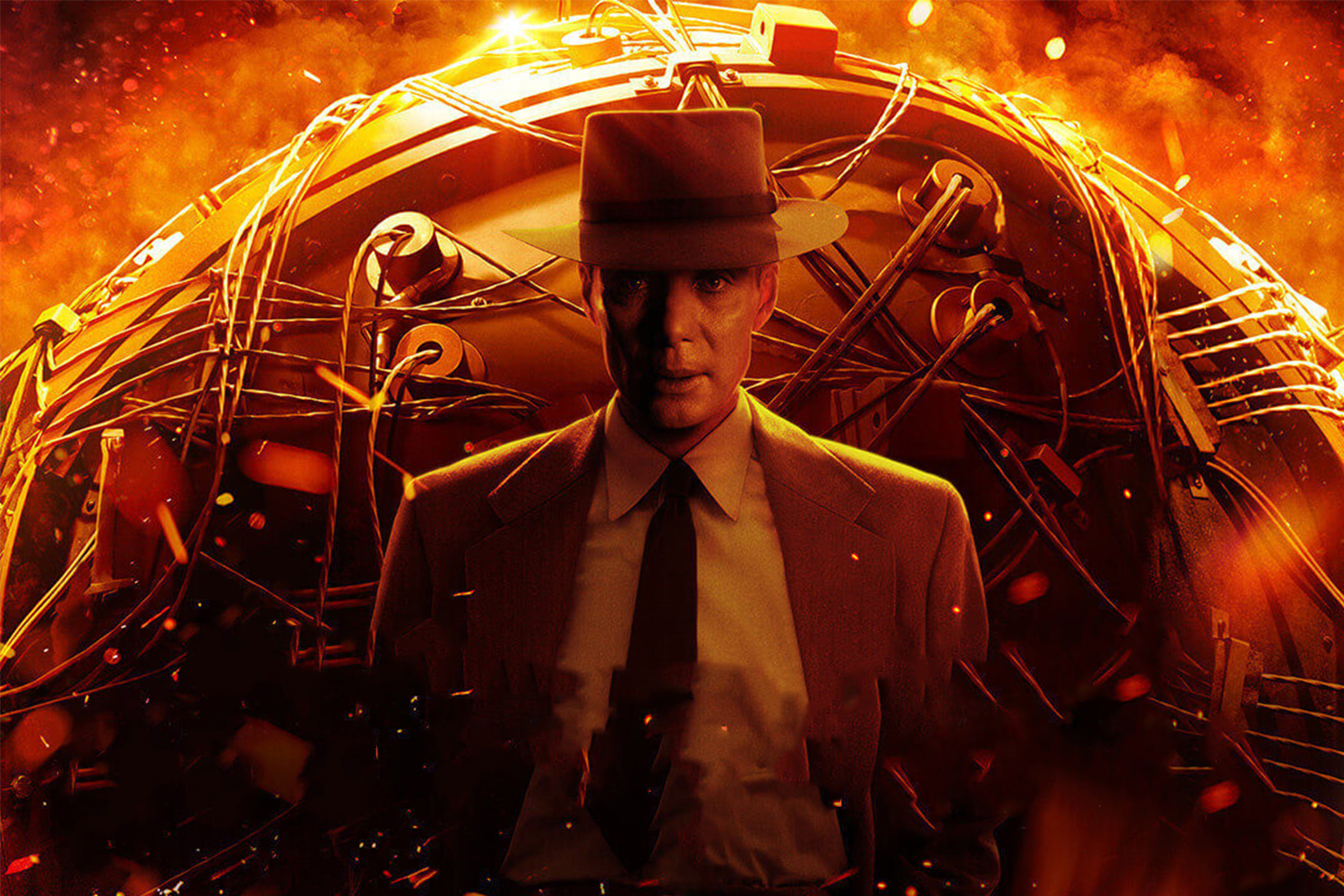 was released on the 78th anniversary of the first nuclear test that ushered in the nuclear age. With Russia’s invasion of Ukraine raising concerns of nuclear warfare, Nolan’s biopic provides an insight into the father of the US nuclear program, the creation of the US atomic bomb, Oppenheimer’s links with communism and his subsequent fall from grace. The film draws directly from American Prometheus, a 2005 biography of Oppenheimer. America’s ability to marshal the resources, knowledge and expertise to develop, test and use the first nuclear weapon had huge geopolitical ramifications which are still with us today. Whilst Nolan’s biopic focuses much on Oppenheimer himself, the film provides a good insight into the challenges and worries US planners faced when trying to win the race to develop the world’s first nuclear bomb. The film is about the race to harness the power of the atomic bomb and its moral quandaries. Nolan’s biopic is really a window into how the atomic bomb came to be with us and the moral dilemmas around it. For those who like to watch rather than read, Nolan’s biopic is not a bad place to start.
was released on the 78th anniversary of the first nuclear test that ushered in the nuclear age. With Russia’s invasion of Ukraine raising concerns of nuclear warfare, Nolan’s biopic provides an insight into the father of the US nuclear program, the creation of the US atomic bomb, Oppenheimer’s links with communism and his subsequent fall from grace. The film draws directly from American Prometheus, a 2005 biography of Oppenheimer. America’s ability to marshal the resources, knowledge and expertise to develop, test and use the first nuclear weapon had huge geopolitical ramifications which are still with us today. Whilst Nolan’s biopic focuses much on Oppenheimer himself, the film provides a good insight into the challenges and worries US planners faced when trying to win the race to develop the world’s first nuclear bomb. The film is about the race to harness the power of the atomic bomb and its moral quandaries. Nolan’s biopic is really a window into how the atomic bomb came to be with us and the moral dilemmas around it. For those who like to watch rather than read, Nolan’s biopic is not a bad place to start.
Wasif Chaudry
Win Every Argument: The Art of Debating, Persuading and Public Speaking
Mehdi Hasan
2023
Mehdi Hasan is considered one of the most form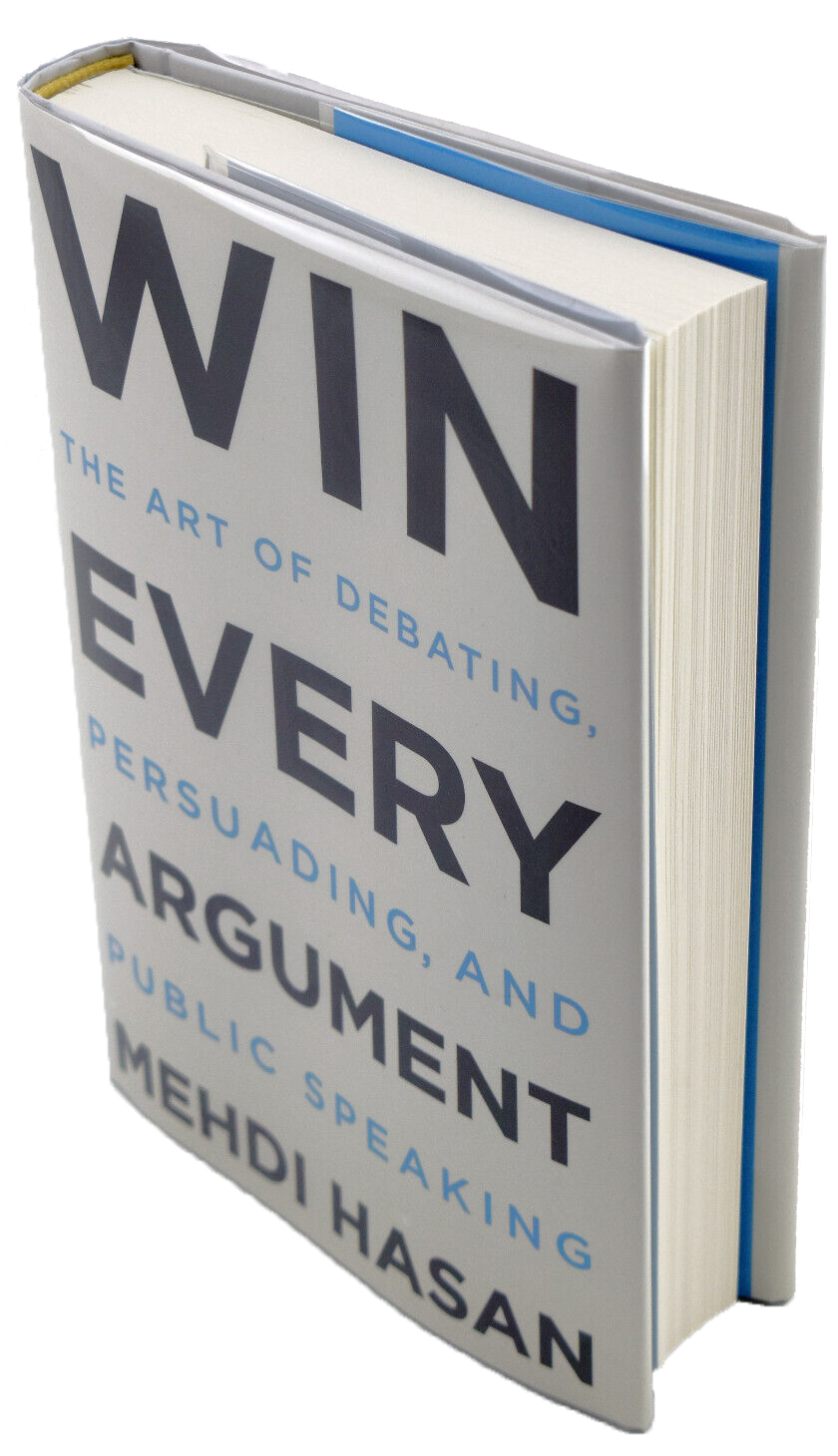 idable modern debaters and interviewers. He made a name for himself on both sides of the Atlantic from the BBC’s Question Time to Al Jazeera’s upfront show or currently on his own show on MSNBC. His hard-hitting exchanges with politicians, pundits and policy makers has earned him a reputation on the speaker’s circuit. With two decades of experience in broadcasting, Mehdi Hasan outlines how to win every argument utilising the techniques, experiences and principles he’s developed in his career. Hasan litters his book with his personal anecdotes, well publicised interviews and historical moments to illustrate his fundamentals. Hasan also makes use of lots of research into the human mind, psychology and sociology. Hasan found that despite all the research of feelings trumping facts many politicians still don’t fully realise this reality. Right-wing parties often win because they have a near-monopoly in the marketplace of emotions, whilst the Left continue to naively place their stock in the marketplace of ideas. Hasan’s book offers an entertaining primer on the techniques for making effective arguments. The examples, history, experiences and research make this a lively book and more than just how to debate and win arguments. The book is an outline of the techniques public speakers and officials use to be effective in the public space. The book also offers simple recommendations that are easy to follow. Hasan’s personal anecdotes, interviews, and historical illustrations show how to apply his recommendations. Hasan bolsters his book with the many interviews and debates with high-ranking political officials from the UK, US and China, to show how to win every argument.
idable modern debaters and interviewers. He made a name for himself on both sides of the Atlantic from the BBC’s Question Time to Al Jazeera’s upfront show or currently on his own show on MSNBC. His hard-hitting exchanges with politicians, pundits and policy makers has earned him a reputation on the speaker’s circuit. With two decades of experience in broadcasting, Mehdi Hasan outlines how to win every argument utilising the techniques, experiences and principles he’s developed in his career. Hasan litters his book with his personal anecdotes, well publicised interviews and historical moments to illustrate his fundamentals. Hasan also makes use of lots of research into the human mind, psychology and sociology. Hasan found that despite all the research of feelings trumping facts many politicians still don’t fully realise this reality. Right-wing parties often win because they have a near-monopoly in the marketplace of emotions, whilst the Left continue to naively place their stock in the marketplace of ideas. Hasan’s book offers an entertaining primer on the techniques for making effective arguments. The examples, history, experiences and research make this a lively book and more than just how to debate and win arguments. The book is an outline of the techniques public speakers and officials use to be effective in the public space. The book also offers simple recommendations that are easy to follow. Hasan’s personal anecdotes, interviews, and historical illustrations show how to apply his recommendations. Hasan bolsters his book with the many interviews and debates with high-ranking political officials from the UK, US and China, to show how to win every argument.
Sufyan Badar
Where Does Money Come From? A guide to the UK monetary and banking system
Josh Ryan-Collins, Tony Greenham, Richard Werner and Andrew Jackson.
2011
With all the talk about the dollar’s demise, Central Bank Digital Currencies  (CBDC), cryptocurrencies and the rise of the Yuan, we need to ask, what is money and where does it come from? The authors explain in the opening chapter the misconceptions about money creation, where many think the government creates money via bank deposits. To support this, Richard Warner carried out an empirical experiment in Germany of where money comes from. The authors deal with these misconceptions in the opening chapters by debunking the popular conception of banks as financial intermediaries and custodians and critique the textbook ‘money multiplier’ model of credit creation and provide an accurate description of the money creation process. Their answer, as explained by Ryan-Collins, Greenham, Werner and Jackson is outrageously simple; your bank creates money out of thin air. The Bank of England says this openly now too. The book makes it very clear in simple and straightforward language that banks are central to the money creation process and therefore a “Where does money come from?” is smart, clear, relatively short and just repetitive enough to make you understand the relevant concepts. Some of their findings will shock you, but that is due to the many misconceptions that exist. If you still can’t get your head around how banks create money out of thin air, Richard Warner carried out an empirical experiment, the first in the 5,000 year history of banking, on the question of whether banks create money out of nothing.
(CBDC), cryptocurrencies and the rise of the Yuan, we need to ask, what is money and where does it come from? The authors explain in the opening chapter the misconceptions about money creation, where many think the government creates money via bank deposits. To support this, Richard Warner carried out an empirical experiment in Germany of where money comes from. The authors deal with these misconceptions in the opening chapters by debunking the popular conception of banks as financial intermediaries and custodians and critique the textbook ‘money multiplier’ model of credit creation and provide an accurate description of the money creation process. Their answer, as explained by Ryan-Collins, Greenham, Werner and Jackson is outrageously simple; your bank creates money out of thin air. The Bank of England says this openly now too. The book makes it very clear in simple and straightforward language that banks are central to the money creation process and therefore a “Where does money come from?” is smart, clear, relatively short and just repetitive enough to make you understand the relevant concepts. Some of their findings will shock you, but that is due to the many misconceptions that exist. If you still can’t get your head around how banks create money out of thin air, Richard Warner carried out an empirical experiment, the first in the 5,000 year history of banking, on the question of whether banks create money out of nothing.
Abdul Latif


